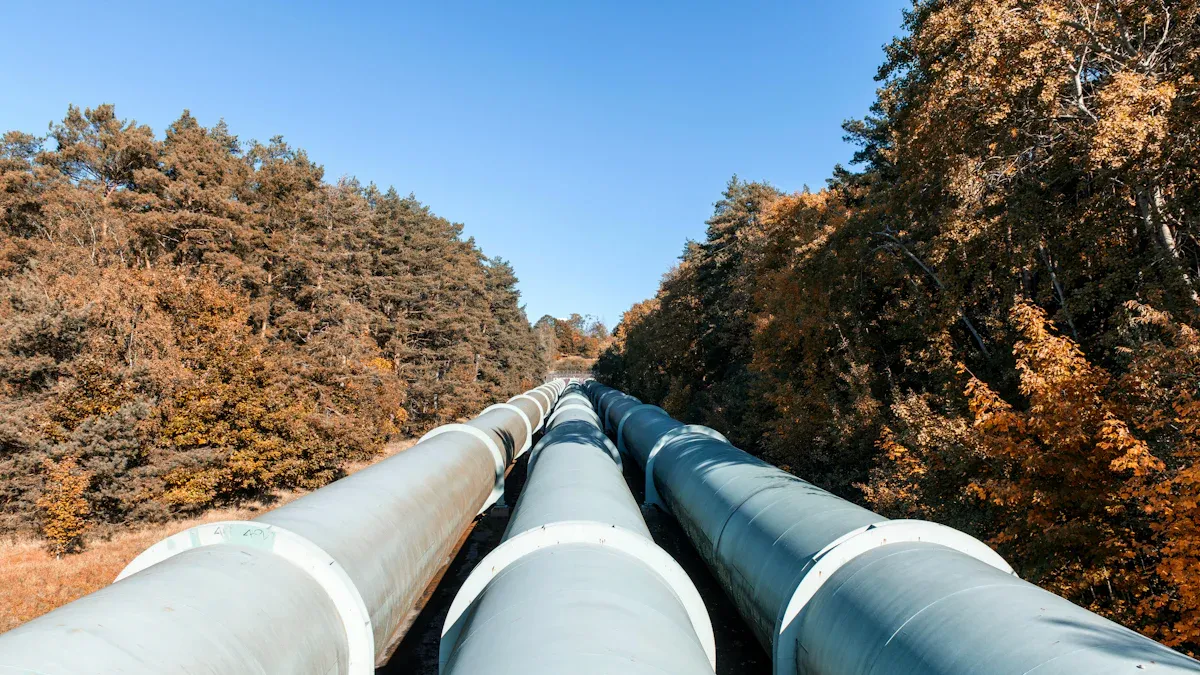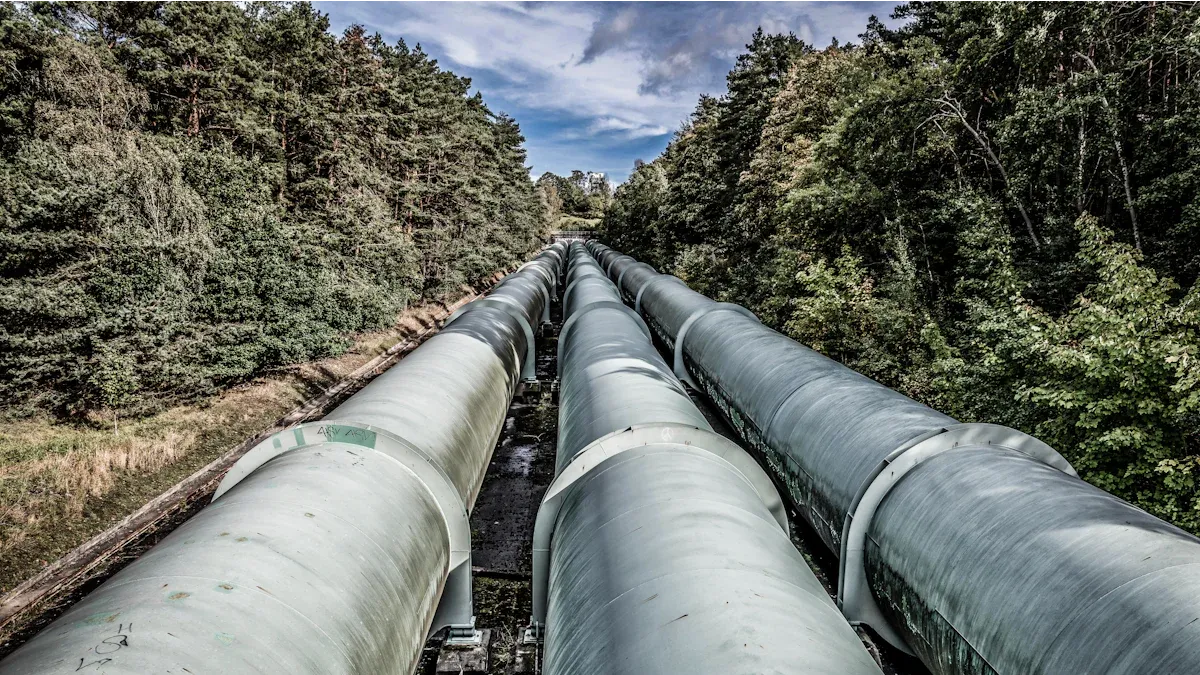How to Choose Efficient Energy Logistics Providers for Your Business

You need to choose energy logistics providers who offer efficient energy logistics solutions to help your business succeed. Reliable providers improve your operations, reduce costs, and help you meet regulations. The right choice boosts your brand and helps you adapt to market changes.
Consider these common selection criteria:
Industry experience and expertise
Proven track record of success
Scalability and flexibility
Technology and innovation
Strong network and infrastructure
Cost-effectiveness and value
Reliability and on-time performance
Commitment to sustainability
Commitment to customer service and communication
Reputation and references
Here is how your provider impacts your business:
Impact Area | Description |
|---|---|
Economic Vulnerability | Reducing dependency on fossil fuels mitigates risks associated with volatile oil prices and geopolitical conflicts. |
Regulatory Demands | Compliance with emissions standards avoids financial penalties and enhances market access. |
Operational Efficiency | Energy-efficient practices lead to reduced fuel costs and improved profit margins. |
Enhanced Resilience | Diversifying energy sources increases adaptability to economic and environmental challenges. |
Market Differentiation | Sustainable practices strengthen brand reputation and attract environmentally conscious clients. |
You should always match your provider’s strengths to your specific needs. Your decision can shape your profitability and sustainability.
Key Takeaways
Choose providers with a strong reputation and proven reliability. Look for certifications and client testimonials to ensure they meet industry standards.
Evaluate logistics capabilities. A provider should manage planning, inventory, and transportation effectively to meet your business goals.
Seek transparent pricing and clear contracts. Understanding all fees and responsibilities helps build trust and avoid disputes.
Prioritize sustainability. Select providers who use green practices, like electric vehicles and energy-efficient warehouses, to lower your carbon footprint.
Utilize technology for efficiency. Real-time tracking and predictive analytics can help you manage shipments and reduce costs.
Key Factors for Efficient Energy Logistics Solutions

Provider Reputation and Reliability
You want a provider with a strong reputation and proven reliability. Good energy logistics companies show their value through certifications, client testimonials, and industry recognition. When you read what other clients say, you learn how the provider handles challenges and communicates.
Here are some real client testimonials:
"I cannot praise or recommend highly enough the service and can-do attitude of Jennifer, her team, and all I encountered within Logistics Plus." – Logistics Manager
"I have been in the business 35 years and I can honestly say I have never seen this level of communication." – North American Sales Manager
"Your customer service is top-notch, and there has never been a challenge you haven’t been able to work with us to resolve." – Senior Project Leader
You should check for certifications and registrations. These show that the provider meets industry standards and follows safety rules. Insurance is also important. It protects your shipments and gives you peace of mind. Strong communication helps you solve problems quickly and keeps your business running smoothly.
You can take these steps to evaluate a provider’s reliability:
Actionable Step | Description |
|---|---|
Assess Information Management Capabilities | Evaluate the IT systems of logistics providers, as a strong information tracking and management system is crucial for efficient operations. Understanding the IT capabilities of potential partners helps ensure they can meet your shipping needs effectively. |
Monitor Delivery Metrics | Regularly track delivery metrics such as shipping time, order accuracy, and delivery time to objectively evaluate the performance of logistics providers. This helps identify areas for improvement and ensures that shipments arrive on time and undamaged. |
Examine Relevant Credentials | Check for necessary certifications, especially for handling hazardous materials, to ensure compliance with regulations and safety standards. This can prevent complications and ensure that the logistics provider is equipped to handle specific shipping needs. |
Review Security Capabilities | Investigate the security measures in place to protect shipments, especially valuable items. A logistics provider should have robust security systems to prevent theft and ensure traceability, which is increasingly important in the current market landscape. |
Full Suite of Logistics Capabilities
Efficient energy logistics solutions require a provider with a full range of capabilities. You need a partner who can manage planning, logistics, inventory, and transportation. Advanced logistics capabilities help you handle complex energy shipments and meet your business goals.
Logistics Capability | Description |
|---|---|
Advanced Logistics Capabilities | Essential for managing the complexities of the energy sector at an unprecedented scale. |
Supply Chain Management | Involves planning, logistics, inventory management, and transportation to ensure smooth operations. |
Efficiency and Compliance | Critical for reducing costs and ensuring timely deliveries while adhering to regulations. |
Providers stand out by offering specialized handling for different energy sources. They use advanced technology, such as automated systems and remote monitoring, to improve safety and efficiency. Some companies offer value-added services like blending and quality analysis. Multimodal transportation lets you choose the best delivery method for each shipment. Flexible network design helps you adapt to market changes. End-to-end logistics packages give you support from procurement to real-time tracking.
Capability Type | Description |
|---|---|
Specialized Handling | Tailored services for various energy sources, ensuring compliance with safety standards. |
Advanced Technology Integration | Use of automated systems and remote monitoring to enhance operational efficiency and safety. |
Value-Added Services | Additional offerings like blending and quality analysis to improve product marketability. |
Multimodal Transportation | Integration of different transport modes for optimized delivery solutions. |
Flexible Network Design | Agile routing capabilities to adapt to changing trade lane economics. |
End-to-End Logistics Packages | Comprehensive services including procurement support and real-time tracking for transparency. |
AI technology helps logistics providers find the best routes for your shipments. By analyzing traffic and weather, AI reduces energy use and emissions. You benefit from faster deliveries and lower costs.
Transparent Pricing and Contracts
You need clear pricing and contracts to build trust with your provider. Transparent contracts help you avoid misunderstandings and disputes. When you know your roles and responsibilities, you can work better with your logistics partner.
Tips for contract management:
Clear contracts prevent misunderstandings and disputes, fostering trust and collaboration.
Well-defined roles and responsibilities enhance operational efficiency.
Effective contract management supports financial stability and compliance with regulations.
Contracts tied to multi-year agreements support long-term planning.
Aligning contracts with broader business objectives aids in market expansion and sustainability efforts.
Proactive contract management identifies growth opportunities and adapts to market changes.
You should review all contract terms before signing. Make sure the provider explains all fees and charges. Ask questions if you do not understand something. Good providers will help you understand every detail. This way, you can focus on growing your business with efficient energy logistics solutions.
Service Capabilities and Sustainability

Shipment Requirements and Flexibility
You need a logistics provider who can handle different shipment requirements and adapt quickly. Flexibility matters when your business faces changing demand or unexpected challenges. Providers use several metrics to measure flexibility and dependability.
Metric/Factor | Description |
|---|---|
Logistics Dependability | Measures reliability in logistics operations. |
Trans-routing Flexibility | Allows for adjustments in routing to adapt to operational changes. |
Multi-factor Design of Experiments | Analyzes interactions between factors affecting logistics performance. |
Flexible transportation services help you adjust plans during execution. This adaptability is essential in markets where demand changes often. Providers who offer these services give you more control and help you avoid delays.
Green Practices and Energy Efficiency
You should look for providers who use green practices. These actions lower your carbon footprint and improve your reputation. Many companies now use electric vehicles and optimize route planning to reduce emissions. Energy-efficient warehouse designs also enhance operational efficiency.
Green Logistics Practices | Impact on Carbon Footprint |
|---|---|
Use of electric vehicles | Reduces emissions |
Optimizing route planning | Lowers fuel consumption |
Energy-efficient warehouse designs | Enhances operational efficiency |
Major companies lead the way. DHL plans to electrify 60% of their last-mile delivery vehicles by 2030. Amazon ordered 100,000 electric delivery vans from Rivian. These steps show a strong commitment to sustainability.
Technology and Data Optimization
Technology plays a key role in efficient energy logistics solutions. Digital platforms and real-time tracking systems allow you to adjust orders and monitor shipments. IoT devices help you track resources and spot problems early. Predictive analytics lets you adjust stock levels and reroute shipments based on demand.
Real-time monitoring detects issues like equipment failures or delays.
Predictive analytics helps you manage inventory and shipments.
Software models carbon footprints and tracks emissions for sustainability.
Blockchain and IoT improve transparency and efficiency in supply chain management.
By integrating utility data with business management systems, you can plan better and cut costs. These tools support compliance with environmental standards and improve customer satisfaction.
Risk Management and Support
Insurance and Compliance
You face many risks in energy logistics. These risks include operational problems, compliance issues, cybersecurity threats, and financial changes. You need strong insurance coverage and a clear compliance plan to protect your business.
Risk Type | Description | Management Strategies |
|---|---|---|
Operational Risks | Capacity shortages and poor route planning can disrupt logistics. | Use monitoring systems and proactive risk management. |
Compliance Risks | Breaking laws can lead to penalties and business disruptions. | |
Cybersecurity Risks | Cyber-attacks can shut down operations and cause financial losses. | Use firewalls and encryption to protect data. |
Financial Risks | Market changes can affect costs and profits. | Understand risks and use strong management strategies. |
You should look for providers who offer these types of insurance:
Coverage Type | Description |
|---|---|
General Liability | Protects against injury and property claims. |
Commercial Auto | Covers accidents with company vehicles. |
Workers' Compensation | Helps employees who get hurt on the job. |
Pollution Liability | Covers accidents or spills that harm others. |
Management Liability | Protects managers from risks like employment issues. |
Compliance rules change often, especially in global trade. You must keep up with new laws and adjust your strategies. Some regions have basic rules, while others have complex systems. Meeting these standards may cost more, but it helps you avoid penalties and keeps your brand safe.
Customer Support and Responsiveness
You need a provider who responds quickly to your needs and emergencies. Fast action can save your business during a crisis. Providers train emergency teams and run drills to prepare for problems. They use safety plans and quick mobilization to reduce damage.
Safety comes first in every operation.
Providers use backup communication systems like satellite phones.
They offer rapid generator deployment and custom power solutions.
Ongoing support and monitoring keep your operations running.
Providers also test their systems to make sure they are ready for any emergency. You benefit from reliable fuel management and crisis prevention teams.
Strategic Industry Relationships
Strong partnerships help you get efficient energy logistics solutions. Providers work with asset-based companies and ports to lower costs and improve service. These relationships help move large cargo, like wind turbines, and support energy projects.
Providers team up with OEMs and utilities to maintain infrastructure.
Partnerships help respond to new regulations.
Financially strong partners adapt to market changes and offer better support.
Some companies, like DHL and Envision, work together on green energy and sustainable logistics parks.
You gain more value when your provider builds strong industry connections. These partnerships lead to better solutions and help your business grow.
You can choose efficient energy logistics providers by following a clear process. Start with supplier registration, enrich data, and check compliance. Use checklists to review infrastructure, technology, and contingency plans. Data-driven solutions help you lower costs and reduce emissions. Providers who focus on sustainability offer long-term benefits like fuel savings and tax incentives. When you contact shortlisted providers, watch for challenges such as supply chain visibility and traffic management. Review your options and reach out to those who match your business needs.
FAQ
What should you check before signing a logistics contract?
Review all terms and fees. Ask the provider to explain unclear points. Make sure you understand your responsibilities. Clear contracts help you avoid disputes and build trust.
How do you know if a provider uses sustainable practices?
Look for electric vehicles, energy-efficient warehouses, and route optimization. Ask for proof of green certifications. Providers often share their sustainability goals on their websites.
Why is technology important in energy logistics?
Technology helps you track shipments in real time. You can spot problems early and adjust plans quickly. Digital tools also help you lower costs and improve efficiency.
What insurance coverage do you need for energy logistics?
You need general liability, commercial auto, workers’ compensation, and pollution liability. These protect your business from accidents, spills, and other risks.
How can you measure a provider’s reliability?
Tip: Check client testimonials, delivery metrics, and industry certifications. Reliable providers communicate well and solve problems quickly.
See Also
Enhancing Global Operations Through Innovative Logistics Strategies
Boosting Global Efficiency With Point-to-Point Logistics Systems
Streamlined Supply Chain Solutions For American Logistics Success
Key Strategies For Effective Global Logistics Management
Optimizing Inventory And Distribution Through Global Logistics Warehousing
